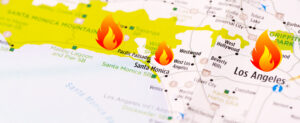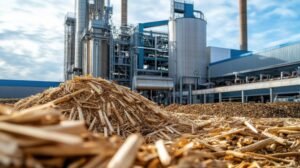
Proxy Discrimination
“The data insurers use for risk-based pricing is data that is actuarially sound and correlated with risk and does not include nor use certain protected class attributes. To argue that insurer use of data, algorithms, or AI in risk-based pricing is biased or skewed would be to say that the actuarially sound data is not representative of the risk the policyholder represents, which insurance laws already prohibit.”
— Lindsey Klarkowski, NAMIC’s policy vice president in data science, AI/[machine learning], and cybersecurity in response to concern from regulators, advocates and policymakers over whether AI in underwriting would lead to proxy discrimination, an algorithmic bias and eventual changes to the affordability and availability of insurance products in certain areas or for certain classes.

Wildfire Mapping
“The reason we map these areas is to tie these really important wildfire mitigations to them, helping us to ensure that as we build out new communities, we’re building to the level of hazard that exists, giving them an increased chance of surviving a wildfire,”
— California State Fire Marshal Daniel Berlant in response to the California’s Department of Forestry and Fire Protection’s new, color-coded maps that place 3.7 million residents in “high” or “very high” fire hazard areas. The maps are based on new tech modeling, climate change and indications of moderate, high and very high areas of wildfire risk.

Poor Data Security Practices
“When companies have poor data security practices, they put individuals at risk of identity theft and other fraud. Auto insurance companies need to make sure that the systems they use to store people’s data are protected to prevent cybercriminals from stealing driver’s license numbers, Social Security numbers, and other private information.”
— New York Attorney General Letitia James in response to securing $975,000 in penalties from auto insurance company Root over a data breach that the state says exposed the personal information of about 45,000 New Yorkers. The settlement follows similar charges resulting in payments of $5.1 million from GEICO and Travelers and $500,000 from Noblr.

Smelly Fertilizer
“The smell is so overwhelming that it goes through my oxygen machine and straight up my nose, which makes it very difficult for me to even walk out my door.”
— Leslie Stewart, a resident of Lincoln County, Oklahoma, commenting on the use of human waste biosolids as agricultural fertilizer. The state is considering a ban on the practice. A recent study from the U.S. Environmental Protection Agency suggests that human health risks associated with toxic per- and polyfluoroalkyl substances (PFAS) were elevated in some places where biosolid sludge was applied to farm fields.

Ineligible Cat Fund Claims
“Over time, information about each claim evolves as the insurer gains information about the cause and origin of the loss. This inherently means that some claims initially identified as hurricane claims are later determined to not be associated with the hurricane, and conversely that some claims intentionally or unintentionally not reported as hurricane claims are determined to be associated with a storm.”
— Universal Property & Casualty Insurance Co., one of Florida’s largest property insurers, after Florida Attorney General James Uthmeier announced the company must pay a $4 million fine — plus attorney fees — for allegedly submitting ineligible Cat Fund claims that it said were the result of 2017’s Hurricane Irma.

Ethanol Carbon Emissions
“We don’t want to see haves and have-nots. We want as many ethanol producers to be able to sequester their CO2 as possible.”
— Tad Hepner, vice president of strategy and innovation at the Renewable Fuels Association, arguing that stopping Summit Carbon Solutions in South Dakota would put ethanol producers in the state at a competitive disadvantage to out-of-state plants connected to the pipeline. The proposed 2,500-mile, $8.9 billion pipeline would carry carbon emissions from ethanol plants in Iowa, Minnesota, Nebraska, North Dakota and South Dakota to be stored underground permanently in North Dakota. Summit said it wants to indefinitely delay its plans after South Dakota passed a law limiting its ability to acquire land for the project.
Was this article valuable?
Here are more articles you may enjoy.


 Ford Recalling 4.3 Million US Vehicles Over Software Issue
Ford Recalling 4.3 Million US Vehicles Over Software Issue  Cuts to Funding Mean Risks Will Pivot in Human Services Market
Cuts to Funding Mean Risks Will Pivot in Human Services Market  Meta Loses Insurance for Defense in Major Social Media Addiction Litigation
Meta Loses Insurance for Defense in Major Social Media Addiction Litigation  What to Know About Killing of Powerful Cartel Leader ‘El Mencho’ in Mexico
What to Know About Killing of Powerful Cartel Leader ‘El Mencho’ in Mexico 


